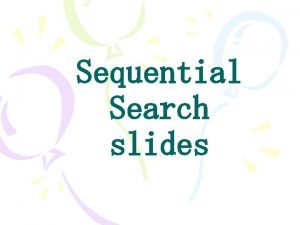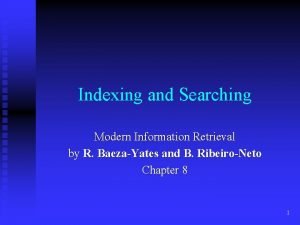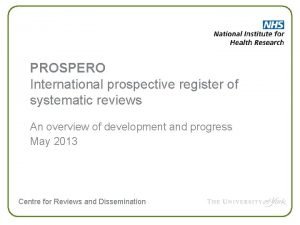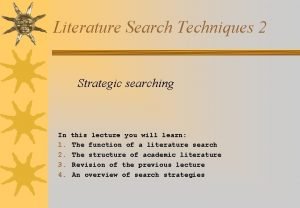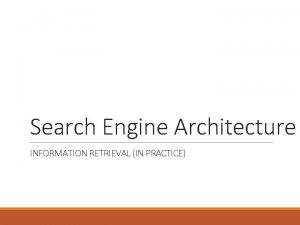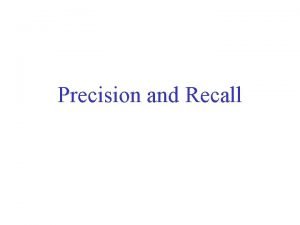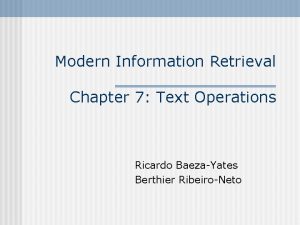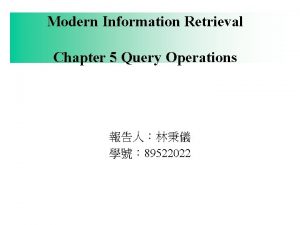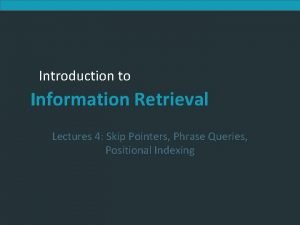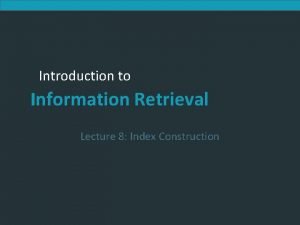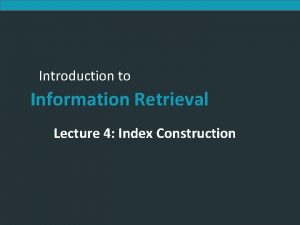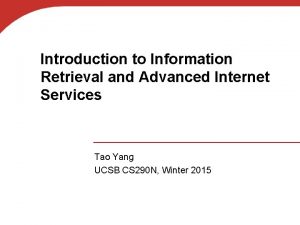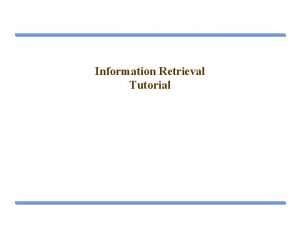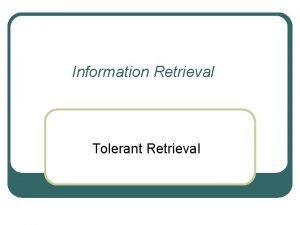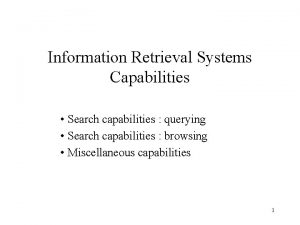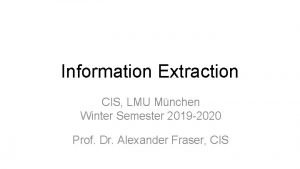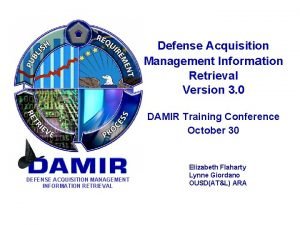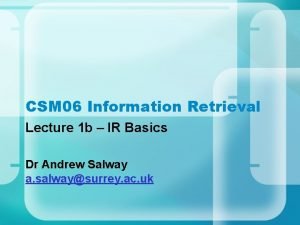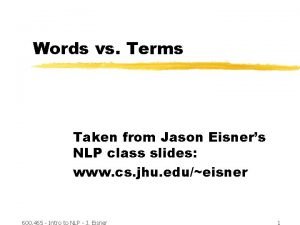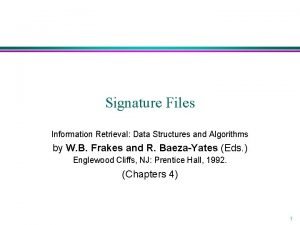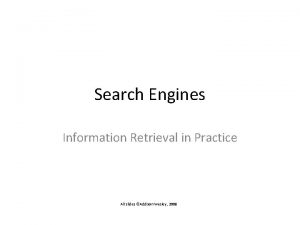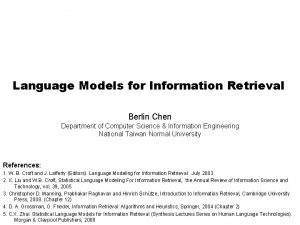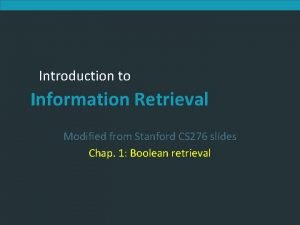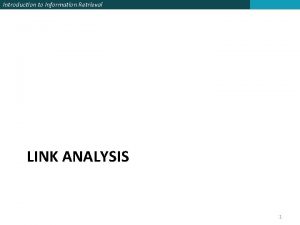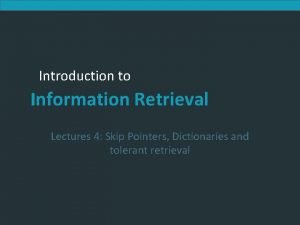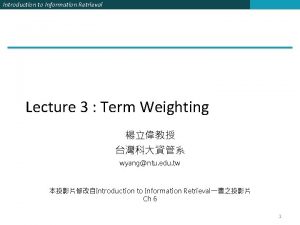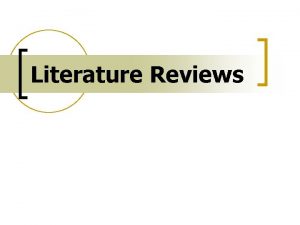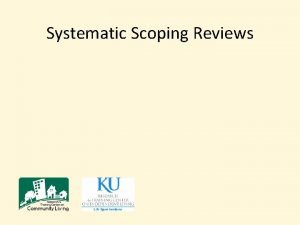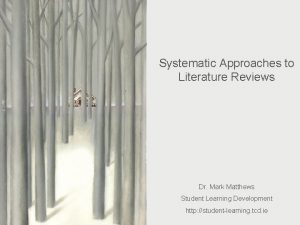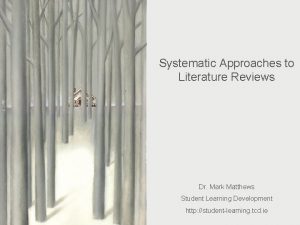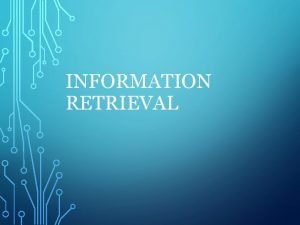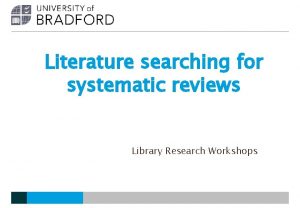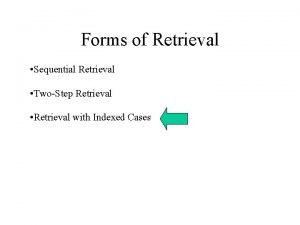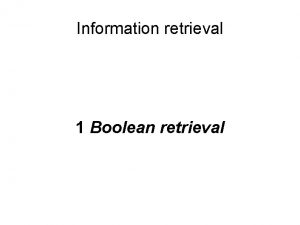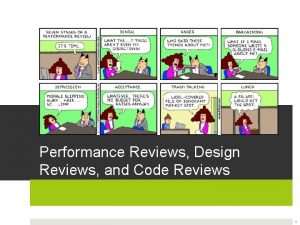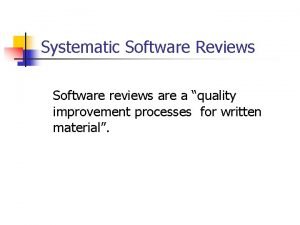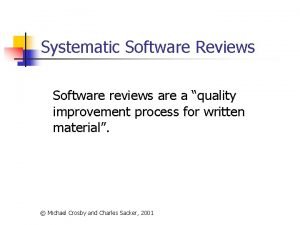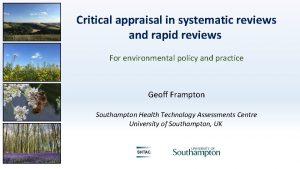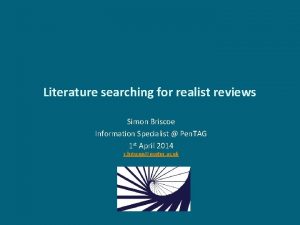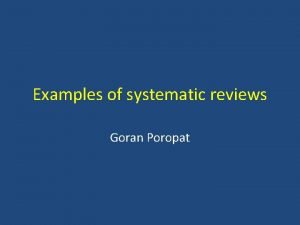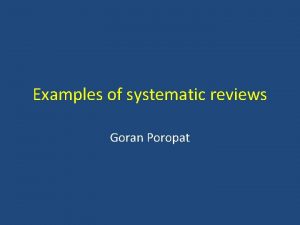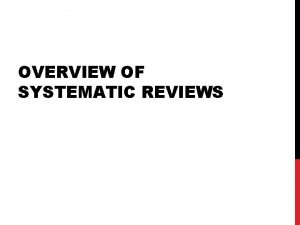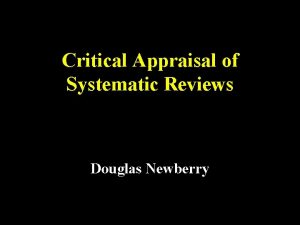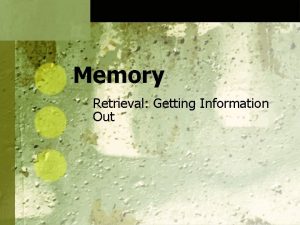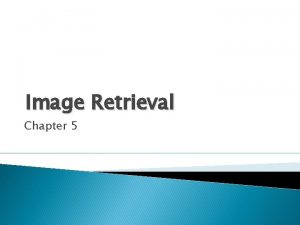Literature Searching Information Retrieval for Systematic Reviews Anne

















![Example search filter #1 randomized controlled trial [pt] #2 controlled clinical trial [pt] #3 Example search filter #1 randomized controlled trial [pt] #2 controlled clinical trial [pt] #3](https://slidetodoc.com/presentation_image/56f4d3b1ae8294ee7918ef8d3c11abc4/image-18.jpg)








- Slides: 26

Literature Searching & Information Retrieval for Systematic Reviews Anne Donnelly Academic Support Librarian 27 th November 2017

Session content § Getting started on your literature search – things to think about. § Strategies for finding the literature. § Searching the literature – key approaches. § Searching the literature – some tools & tips. § Additional resources & information.

Finding the research literature: bear in mind § Not all research is reported or published in journals. § Not all research published in journals is indexed in major databases. § Research is not always described in the same way by authors or indexed consistently. § Many reviews do not appear in major databases and must be retrieved by e. g. searching the web, hand searching or scanning reference lists.

First things first 1. Consider your research question. 2. You may wish to undertake a scoping review, i. e. a type of literature review that aims rapidly to ‘map’ the relevant research in a given field of interest, thereby seeing just what is out there and who else may have carried out similar research. Scoping review Systematic review Study question Often broad Focused Search strategy Systematic & transparent In/exclusion criteria Flexible Defined a priori Study appraisal Non/minor Yes Synthesis Typically qualitative Often quantitative Credit: http: //hlwiki. slais. ubc. ca/index. php/Scoping_reviews

Searching the literature: where? § Bibliographic databases, e. g. Medline, Web of science, Psyc. INFO, other specialist o Each has its strengths, with no single source indexing everything in the field covered. o Don’t worry about any overlap – that’s where your reference management system comes in (more of which later!) § Trials registers. § Grey literature - produced outwith traditional commercial or academic publishing and distribution channels. § Internet - you’ll need to be focused! § Hand-searching journals. § Reference lists. § Citation searching.

Searching the literature: points to ponder Savoie et al (2000) § Estimated that 29. 2% of items in their review were uncovered by: o searching the web o hand searching o scanning reference lists o personal communication o searching specialised databases and web sites Cheng et al (1998) § Only 8. 1% of a set of conference papers achieved publication within 12 months, 40% within 5 years. Hopewell et al (2007) § § Cochrane review trials with positive results are published sooner than other trials. Indexing lag between publication and recording in databases.

Getting started (1) Frame your research question, e. g. What is the effectiveness of cognitive behaviour therapy in chronic fatigue syndrome? § This will help you clarify what you want to find out and help you achieve focus. 2. Identify the principal concepts § These will give you the keywords for your search. 3. Think about § Synonyms, related terms, homonyms, antonyms. § Current and historic variations in terminology & spelling. § Abbreviations & variations in word endings.

Getting started (2) 4. Decide on your inclusion & exclusion criteria § These will establish the boundaries of your search, which may relate to specific publication years, geography, age/sex of study subjects etc. 5. Plan the literature search § Identify the resources that will help you locate appropriate studies. § Decide on your search strategy, which may require adaptation for the difference resources used. 6. Decide how you will document the process & manage your results § This really needs to be done from Day One!

Searching the literature: with PICO P I C O Population, Patient, Problem Intervention (or exposure) Comparison Outcome e. g. What is the effectiveness of cognitive behaviour therapy in chronic fatigue syndrome? P I C O Patients with chronic fatigue syndrome Cognitive behavioural therapy (CBT) Otherapies, e. g. nutritional supplements or placebo e. g. Improved symptoms

Population Chronic fatigue syndrome Cognitive behaviour therapy Intervention Improvement in symptoms Outcome

Boolean searching (AND, OR & NOT) Results retrieved from your search … Boolean operator … must include all your search terms Insert AND between your keywords to narrow your search. … must include at least one of your search terms Insert OR between your keywords to broaden your search. … must not include a specified term Insert NOT before the word that represents what you wish to exclude, to eliminate certain results, thereby narrowing your search. 11

Applying Boolean operators (1) Boolean operator AND OR NOT Examples children AND literacy diet AND obesity poverty AND health 1960 s OR sixties OR ‘ 60 s paediatric OR pediatric language OR dialect pregnancy NOT childbirth media NOT internet insects NOT wasps Retrieves

Applying Boolean operators (2) What is the effectiveness of cognitive behaviour therapy in chronic fatigue syndrome? ? Boolean operator Examples AND chronic fatigue syndrome AND cognitive behaviour therapy OR cognitive behavior therapy OR CBT NOT cognitive behaviour therapy NOT group Retrieves

Expanding the search Keyword Alternative ME post viral fatigue syndrome fibromyalgia cognitive behavior therapy (US) CBT placebo nutritional supplements treatment outcome observational study case control study trial chronic fatigue syndrome CFS cognitive behaviour therapy (UK) effectiveness

Undertaking your search Note § § § Trial & error may be required! Some ‘translation’ may be needed when switching from one database to another. Important to explore all possible keywords to address lack of consistency in the assignment of indexing terms. Combining your terms with Boolean operators § e. g. (chronic fatigue syndrome OR CFS) AND (cognitive behaviour therapy OR CBT) § e. g. (CFS OR post viral fatigue syndrome) AND (placebo or supplement) AND randomized controlled trial 15

Widening your search: cited reference search Why? § You have identified a good paper … Prins JB et al, Cognitive behaviour therapy for chronic fatigue syndrome: a multi centre randomised controlled trial. Lancet 2001, 357, 841 -847. § However, it’s a bit dated, and you want to find more recent research on the same topic. How? § Ovid databases (Psych. INFO, Medline, Embase): ‘Find citing articles’. § Web of Science: ‘Cited reference search’.

Using search filters What are they? § § § Tried and tested strategies, often taking some time to design, that are intended for repeated used. Ideal for systematic reviews where a high level of sensitivity is required. Intended for repeated use, combined with specific search terms. Using search filters § Not all are effective! o Check the scope and aims of a filter to assess its relevance and suitability for your research strategy. o Understand how they work, i. e. high sensitivity with high precision. o Use with caution and an awareness of their possible impact. § Necessary to ‘translate’ search terms for individual databases.
![Example search filter 1 randomized controlled trial pt 2 controlled clinical trial pt 3 Example search filter #1 randomized controlled trial [pt] #2 controlled clinical trial [pt] #3](https://slidetodoc.com/presentation_image/56f4d3b1ae8294ee7918ef8d3c11abc4/image-18.jpg)
Example search filter #1 randomized controlled trial [pt] #2 controlled clinical trial [pt] #3 randomized [tiab] #4 placebo [tiab] #5 drug therapy [sh] #6 randomly [tiab] #7 trial [tiab] #8 groups [tiab] #9 #1 OR #2 OR #3 OR #4 OR #5 OR #6 OR #7 OR #8 #10 animals [mh] NOT humans [mh] #11 #9 NOT #10 Glanville JM, Lefebvre C, Miles JN, Camosso-Stefinovic J. How to identify randomized controlled trials in MEDLINE: ten years on. J Med Libr Assoc. 2006 Apr, 94(2): 130 -6.

More on search filters ISSG Search Filters Resource § § § Web directory of evaluated methodological search filters. Bibliographic references to published filters. Information about unpublished filters/filters in progress. Independent, structured, critical appraisal for many of the methodological search filters. Comparative data from independent testing of search filters. Filters for systematic reviews and other studies. https: //sites. google. com/a/york. ac. uk/issg-search-filters-resource/home

Create a test set to test your strategy What is a test set? § A set of bibliographic references that you would expect your search strategy to retrieve. Why create a test set? § It will help you to identify a search strategy that will retrieve the results you want. How to create a test set § § Identify some key studies, either ones you are aware of or perhaps by checking studies that have been included in an earlier review. Check that each is available in the database you are using and record the accession numbers, thereby creating your test set. Testing your test set § § Run your search strategy and check the results against your test set. If not all records in your test set are retrieved, you will need to revised your search strategy!

Documenting the process – theory Why? § § § Transparency and reproducibility. It’s good academic practice. For the sake of your sanity – seriously! What? § List databases and all other sources. When? § As it happens, from Day One!

Documenting the process – in action! 1. Do it as it happens! 2. List the databases searched. 3. Note the dates of the last search for each database and the years of publication that were searched. 4. Document your search strategy. 5. Keep notes of your search results. 6. Set up alerts on the search tools to keep track of new research and articles published in your research area. 7. List grey literature sources. 8. List any journals and conference proceedings that were hand-searched. 9. List individuals and organisations contacted. 10. Make very good use of referencing software. 11. STARLITE [Sampling strategy, type of study, approaches, range of years, limits, inclusions and exclusions, terms used, electronic sources used. ]

Bibliographic management tools http: //www. docs. is. ed. ac. uk/mvm/Biblio. Managers. Table. pdf Take the misery out of reference management! By helping you to … § Collect, organise, annotate & describe your references § Cite them in your work § Style your references for your dissertation, Ph. D thesis, journal paper or book chapter. Some bibliographic management tools § End. Note X 7 – provided on all Uo. E PCs and fully supported with training materials. § End. Note Web – free on the Web and fully supported with the training materials. § Some other free web-based systems: Mendeley, Zotero. Image: flickr. com 23

Additional resources Systematic Reviews: CRD’s guidance for undertaking reviews in health care http: //www. york. ac. uk/inst/crd/index_guidance. htm Gough, Oliver & Thomas. An introduction to systematic reviews. London: SAGE, 2017. Q 180. A 1 Int 2017 – multiple locations

Further reading 1. 2. 3. 4. 5. 6. 7. 8. Booth A. ‘Unpacking your literature search toolbox: on search styles and tactics’. Health Information and Libraries Journal 2008; 25(4): 313 -7. Cheng, K. , C. Preston, et al. (1998). "Time to publication as full reports of abstracts of randomized controlled trials in cystic fibrosis. " Pediatric Pulmonology 26(2): 101 -105. Cochrane Collaboration. Cochrane handbook for systematic reviews of interventions. http: //www. cochrane-handbook. org/. Centre for Reviews and Dissemination. Undertaking systematic reviews of research on effectiveness: CRD's guidance for those carrying out or commissioning reviews. http: //www. york. ac. uk/inst/crd/report 4. htm. Egger, M. , P. Juni, et al. (2003). "How important are comprehensive literature searches and the assessment of trial quality in systematic reviews? Empirical study. " Health Technology Assessment 7(1): 1 -76. Hopewell S, Mc. Donald S, Clarke MJ, Egger M. Grey literature in meta-analyses of randomized trials of health care interventions. Cochrane Database of Systematic Reviews 2007, Issue 2. Art. No. : MR 000010. DOI: 10. 1002/14651858. MR 000010. pub 3. Khan K S, Kunz R, Kleijnen J, Antes G Systematic Reviews to support Evidence Based Medicine London: Hodder Arnold 2011 Savoie, I. , D. Helmer, et al. (2003). Beyond Medline: reducing bias through extended systematic review search. International Journal of Technology Assessment in Health Care 19(1): 168 -78.

Help Do please just get in touch for further information & guidance! anne. donnelly@ed. ac. uk
 Sequential searching
Sequential searching Sequential searching in information retrieval
Sequential searching in information retrieval Prospero register
Prospero register Literature search techniques
Literature search techniques Information retrieval architecture
Information retrieval architecture What is precision and recall in information retrieval
What is precision and recall in information retrieval Modern information retrieval
Modern information retrieval Query operations in information retrieval
Query operations in information retrieval Skip pointer information retrieval
Skip pointer information retrieval Index construction in information retrieval
Index construction in information retrieval Bsbi vs spimi
Bsbi vs spimi Which internet service is used for information retrieval
Which internet service is used for information retrieval Information retrieval tutorial
Information retrieval tutorial Wildcard queries in information retrieval
Wildcard queries in information retrieval Capabilities of information retrieval system
Capabilities of information retrieval system Link analysis in information retrieval
Link analysis in information retrieval Information retrieval lmu
Information retrieval lmu Defense acquisition management information retrieval
Defense acquisition management information retrieval Advantages of information retrieval system
Advantages of information retrieval system Information retrieval nlp
Information retrieval nlp Information retrieval data structures and algorithms
Information retrieval data structures and algorithms Search engines information retrieval in practice
Search engines information retrieval in practice Relevance information retrieval
Relevance information retrieval Stanford information retrieval
Stanford information retrieval Link analysis in information retrieval
Link analysis in information retrieval Skip pointers in information retrieval
Skip pointers in information retrieval Information retrieval
Information retrieval
